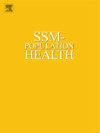What role does wealth play in the racial health gap in the United States? Examining differences among African Americans, Latinos, and non-Hispanic Whites
IF 3.6
2区 医学
Q1 PUBLIC, ENVIRONMENTAL & OCCUPATIONAL HEALTH
引用次数: 0
Abstract
Wealth resources has received little attention when studying how socioeconomic status shapes health outcomes. In the United States (USA), there is a growing body of evidence acknowledging a widening racial/ethnic wealth gap. However, little is known about wealth's role in shaping health inequity. Hence, our study examined the role wealth plays in the racial health gap across and within three racial/ethnic groups (African Americans – AA; Latinos –L; non-Hispanic Whites – NHW). We used nine waves of the nationally representative Survey of Consumer Finances (1995–2019). Trends over time were estimated with survey-weighted descriptive statistics. A series of linear probability regression models predicted fair/poor health based on overall and within-group wealth position, along with sociodemographic variables. Regression models revealed that both overall and within-racial-group wealth position matter when examining health outcomes. In fully adjusted models, racial health gaps practically disappeared for overall wealth position. While overall wealth position moderates the race-health path similarly for AA and NHW, the probability of fair/poof health for high-wealth Latinos is the same as medium-wealth AA and NHW. When considering within-group wealth position, AA and L have similar levels of fair/poor health (and significantly higher than NHW). Moreover, within-NHW wealth position matters for health at each level of wealth, while within-AA and within-L improvements are only evident at the high-wealth level. Our study provides evidence that wealth shapes health inequities differently when considering the overall wealth and within-racial group wealth. Policies to reduce wealth-health gaps should consider low and middle-wealth AA, L, and NHW.
财富在美国种族健康差距中扮演什么角色?研究非裔美国人、拉丁裔和非西班牙裔白人之间的差异。
在研究社会经济地位如何影响健康结果时,财富资源很少受到关注。在美国,有越来越多的证据表明种族/民族财富差距正在扩大。然而,人们对财富在形成健康不平等方面的作用知之甚少。因此,我们的研究考察了财富在三个种族/族裔群体之间和内部的种族健康差距中所起的作用(非裔美国人- AA;拉丁美洲人- l;非西班牙裔白人(NHW)。我们使用了九波具有全国代表性的消费者财务调查(1995-2019)。通过调查加权描述性统计估计了一段时间内的趋势。一系列线性概率回归模型根据总体和群体内的财富状况以及社会人口变量预测健康状况良好/较差。回归模型显示,在检查健康结果时,整体和种族群体内部的财富状况都很重要。在完全调整后的模型中,种族健康差距实际上在总体财富地位中消失了。虽然总体财富状况对种族健康路径的调节作用与AA和NHW相似,但高财富拉美裔人健康状况良好/良好的概率与中等财富AA和NHW相同。在考虑群体内的财富地位时,AA和L的健康水平相似(且显著高于NHW)。此外,nhw内的财富地位对每个财富水平的健康都有影响,而aa内和l内的改善仅在高财富水平上明显。我们的研究提供的证据表明,当考虑到整体财富和种族群体内的财富时,财富对健康不平等的影响是不同的。减少财富与健康差距的政策应考虑中低收入人群的AA、L和NHW。
本文章由计算机程序翻译,如有差异,请以英文原文为准。
求助全文
约1分钟内获得全文
求助全文
来源期刊

Ssm-Population Health
PUBLIC, ENVIRONMENTAL & OCCUPATIONAL HEALTH-
CiteScore
6.50
自引率
2.10%
发文量
298
审稿时长
101 days
期刊介绍:
SSM - Population Health. The new online only, open access, peer reviewed journal in all areas relating Social Science research to population health. SSM - Population Health shares the same Editors-in Chief and general approach to manuscripts as its sister journal, Social Science & Medicine. The journal takes a broad approach to the field especially welcoming interdisciplinary papers from across the Social Sciences and allied areas. SSM - Population Health offers an alternative outlet for work which might not be considered, or is classed as ''out of scope'' elsewhere, and prioritizes fast peer review and publication to the benefit of authors and readers. The journal welcomes all types of paper from traditional primary research articles, replication studies, short communications, methodological studies, instrument validation, opinion pieces, literature reviews, etc. SSM - Population Health also offers the opportunity to publish special issues or sections to reflect current interest and research in topical or developing areas. The journal fully supports authors wanting to present their research in an innovative fashion though the use of multimedia formats.
 求助内容:
求助内容: 应助结果提醒方式:
应助结果提醒方式:


